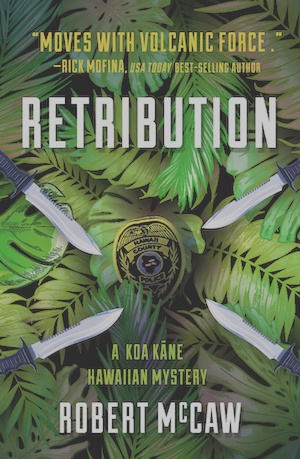
Retribution is the fifth in Robert McCaw’s series of police procedurals set on the Big Island of Hawai`i that feature Chief Detective Koa Kāne. If you’re in the mood for a visit to Hawai`i, get hold of these books! The atmosphere is thick with tropical sights, smells and sounds. Not for a minute can you forget where you are: the volcanos, the lava fields, the mist and rainbows, the ocean, the sea turtles, the tropical forest, the rare orchids. McCaw even teases you with mentions of Kona coffee. Although his writing style is straightforward, the musical Hawaiian language and incidental descriptions of the environment create a rich portrayal of the place as a character.
But alas, even a tropical paradise has its ne’er-do-wells. Late one night, when the book opens, the Philippine freighter Bimi is headed toward the Big Island’s port of Hilo. Offshore, a speedboat comes alongside and a mysterious passenger climbs down to it on a shaky rope ladder. He has a single suitcase and a long flat gun case. The powerboat roars away and the one issue on this voyager’s mind is avenging the death of his brother. He’s just the first of a small company of mysterious characters who will keep you guessing about who they are and what they’re up to as, over a period of weeks, a succession of potentially deadly attacks rocks the island.
Koa Kāne enters the story when he is called on to investigate the vicious stabbing death of a local thief and drug user. Unfortunately, mounting evidence suggests the killer was Kāne’s own brother. Ikaika had been a career criminal until doctors detected several brain tumours that, once removed, ended his aberrant behaviour. But some in the police department aren’t willing to accept that he’s changed.
Naturally, Kāne must withdraw from this case, no matter how convinced he is that Ikaika is being framed, and the chief puts Deputy Chief Detective Moreau in charge. A recent addition to the department, Moreau has displayed little investigatory experience or skill and is trailed by accusations of excessive use of force. In fact, his only asset is the unflinching support of Hilo’s ambitious new mayor, and Moreau relishes the opportunity to undermine his rival Kāne by incarcerating his brother. You can feel Kāne’s frustration and his admirable sense of loyalty to his brother, but there’s a larger, deeper problem: he’s convinced Moreau poses a risk to the department and its reputation.
However much Hilo’s law enforcement personnel may dislike Moreau, they like and trust Kāne, and he reaps the benefit of that trust by securing his colleagues’ investigative and legal help. The author conveys the kind of stand-up guy Kāne is, not in so many words, but by showing how those around him act toward him. Each of his colleagues has a distinctive and likeable personality. They make a solid team, one you can definitely root for.
Yes, he’d love to figure out a way to get Moreau off the force but that won’t be easy with a mayor who threatens Kāne’s job unless he knuckles under. I found the mayor a little over-the-top, but he appears infrequently.
While the mayor has trimmed police budgets, the perpetrators of the attacks seem to have bottomless resources. The attacks circle closer and closer to Kāne himself, yet he tenaciously pursues the investigation, despite swimming in a sea of uncertainty. What triggered this eruption of violence? Is it someone the police put away years ago? Is it local antifa activists? Or is it even closer to home, someone in the police department itself? These questions, which operate on separate political and historical planes, make it a challenge to put the pieces of the story together right up until the last chapters.
McCaw never sacrifices character development to the maintenance of the story’s fast pace. While it’s hardly a tropical vacation, you nevertheless feel like the author has taken you someplace distinctive, and given you an engaging story there.
In an author’s note, McCaw takes pains to distinguish between revenge, as an act of passion, and vengeance, as a quest for justice. ‘The difference between revenge and vengeance has never been more vital than in our country today,’ he writes, when the slightest offense ‘can provoke disproportionate, even lethal revenge.’ Presumably, this novel is a result of meditating on this state of affairs, and his bad guys exhibit a range of self-justifications. Their evil acts, whether of revenge or vengeance, are fully deserving of the retribution meted out.
See our interview with the author here. For another atmospheric Hawaiian mystery see Hokuloa Road by Elizabeth Hand.
Oceanview Publishing
Print
£21.54
CFL Rating: 4 Stars










